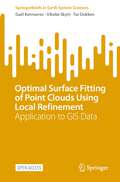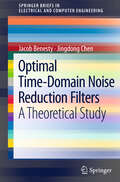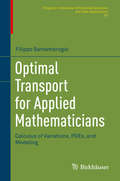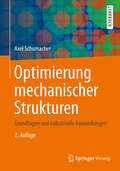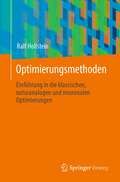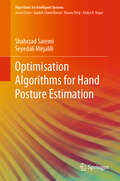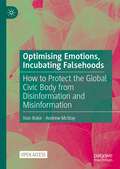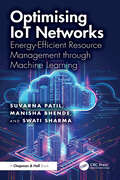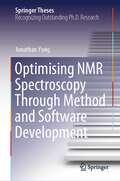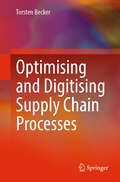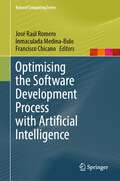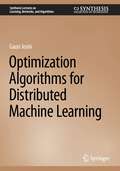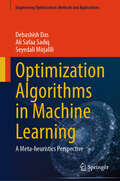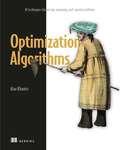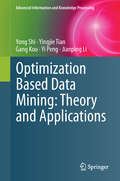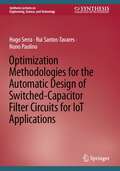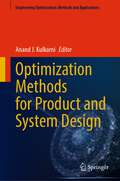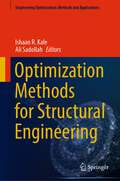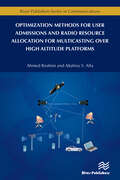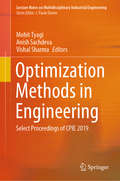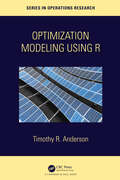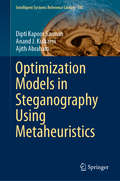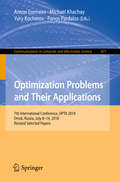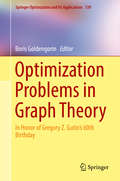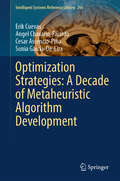- Table View
- List View
Optimal Surface Fitting of Point Clouds Using Local Refinement: Application to GIS Data (SpringerBriefs in Earth System Sciences)
by Tor Dokken Gaël Kermarrec Vibeke SkyttThis open access book provides insights into the novel Locally Refined B-spline (LR B-spline) surface format, which is suited for representing terrain and seabed data in a compact way. It provides an alternative to the well know raster and triangulated surface representations. An LR B-spline surface has an overall smooth behavior and allows the modeling of local details with only a limited growth in data volume. In regions where many data points belong to the same smooth area, LR B-splines allow a very lean representation of the shape by locally adapting the resolution of the spline space to the size and local shape variations of the region. The iterative method can be modified to improve the accuracy in particular domains of a point cloud. The use of statistical information criterion can help determining the optimal threshold, the number of iterations to perform as well as some parameters of the underlying mathematical functions (degree of the splines, parameter representation). The resulting surfaces are well suited for analysis and computing secondary information such as contour curves and minimum and maximum points. Also deformation analysis are potential applications of fitting point clouds with LR B-splines.
Optimal Time-Domain Noise Reduction Filters
by Jacob Benesty Jingdong ChenAdditive noise is ubiquitous in acoustics environments and can affect the intelligibility and quality of speech signals. Therefore, a so-called noise reduction algorithm is required to mitigate the effect of the noise that is picked up by the microphones. This work proposes a general framework in the time domain for the single and multiple microphone cases, from which it is very convenient to derive, study, and analyze all kind of optimal noise reduction filters. Not only that all known algorithms can be deduced from this approach, shedding more light on how they function, but new ones can be discovered as well.
Optimal Transport for Applied Mathematicians
by Filippo SantambrogioThis monograph presents a rigorous mathematical introduction to optimal transport as a variational problem, its use in modeling various phenomena, and its connections with partial differential equations. Its main goal is to provide the reader with the techniques necessary to understand the current research in optimal transport and the tools which are most useful for its applications. Full proofs are used to illustrate mathematical concepts and each chapter includes a section that discusses applications of optimal transport to various areas, such as economics, finance, potential games, image processing and fluid dynamics. Several topics are covered that have never been previously in books on this subject, such as the Knothe transport, the properties of functionals on measures, the Dacorogna-Moser flow, the formulation through minimal flows with prescribed divergence formulation, the case of the supremal cost, and the most classical numerical methods. Graduate students and researchers in both pure and applied mathematics interested in the problems and applications of optimal transport will find this to be an invaluable resource.
Optimierung mechanischer Strukturen
by Axel SchumacherZiel des Buches ist es, die notwendigen Kenntnisse für den effizienten Einsatz von mathematischen Optimierungsverfahren in der Strukturauslegung von Bauteilen zu vermitteln. Der Autor bezieht die neuesten Entwicklungen und Anwendungsbereiche auf dem Gebiet der Optimierung ein.
Optimierungsmethoden: Einführung in die klassischen, naturanalogen und neuronalen Optimierungen
by Ralf HollsteinDas Buch gibt eine breite Übersicht über die wichtigsten Optimierungsmethoden, wobei die Verfahren beispielhaft erläutert und mit über 400 Abbildungen illustriert werden. Im ersten Teil des Buches werden verschiedene Klassen von Optimierungsproblemen vorgestellt. Gegenstand des zweiten Teils sind klassische Methoden zur Lösung von Optimierungsproblemen. Im dritten Teil werden naturanaloge Optimierungsmethoden behandelt, darunter physikbasierende Algorithmen, evolutionäre Algorithmen, schwarmintelligente Methoden sowie Optimierungsverfahren, die durch das Immunsystem inspiriert sind. Der letzte Teil des Buches befasst sich mit der Optimierung neuronaler Netze und gibt eine Einführung in ein neues vielversprechendes Forschungsgebiet der KI-basierten, selbstlernenden Optimierungsalgorithmen.
Optimisation Algorithms for Hand Posture Estimation (Algorithms for Intelligent Systems)
by Seyedali Mirjalili Shahrzad SaremiThis book reviews the literature on hand posture estimation using generative methods, identifying the current gaps, such as sensitivity to hand shapes, sensitivity to a good initial posture, difficult hand posture recovery in cases of loss in tracking, and lack of addressing multiple objectives to maximize accuracy and minimize computational cost. To fill these gaps, it proposes a new 3D hand model that combines the best features of the current 3D hand models in the literature. It also discusses the development of a hand shape optimization technique. To find the global optimum for the single-objective problem formulated, it improves and applies particle swarm optimization (PSO), one of the most highly regarded optimization algorithms and one that is used successfully in both science and industry. After formulating the problem, multi-objective particle swarm optimization (MOPSO) is employed to estimate the Pareto optimal front as the solution for this bi-objective problem. The book also demonstrates the effectiveness of the improved PSO in hand posture recovery in cases of tracking loss. Lastly, the book examines the formulation of hand posture estimation as a bi-objective problem for the first time.The case studies included feature 50 hand postures extracted from five standard datasets, and were used to benchmark the proposed 3D hand model, hand shape optimization, and hand posture recovery.
Optimising Emotions, Incubating Falsehoods: How to Protect the Global Civic Body from Disinformation and Misinformation
by Andrew McStay Vian BakirThis open access book deconstructs the core features of online misinformation and disinformation. It finds that the optimisation of emotions for commercial and political gain is a primary cause of false information online. The chapters distil societal harms, evaluate solutions, and consider what must be done to strengthen societies as new biometric forms of emotion profiling emerge. Based on a rich, empirical, and interdisciplinary literature that examines multiple countries, the book will be of interest to scholars and students of Communications, Journalism, Politics, Sociology, Science and Technology Studies, and Information Science, as well as global and local policymakers and ordinary citizens interested in how to prevent the spread of false information worldwide, both now and in the future.
Optimising IoT Networks: Energy-Efficient Resource Management through Machine Learning
by Swati Sharma Manisha Bhende Suvarna PatilWith a specific focus on energy efficiency, Optimizing IoT Networks examines the application of machine learning to enhance resource allocations in IoT networks.It discusses various algorithms, including neural networks and reinforcement learning, to optimise resource use and improve network performance. It addresses challenges such as the dynamic behaviour of IoT devices and the need for real-time decision-making. It discusses optimisation methods used alongside machine learning to enhance resource allocation efficiency.• Provides a foundational understanding of IoT network architecture and the importance of efficient resource allocation• Discusses complexities in resource allocation due to dynamic device behaviour and varying data traffic patterns• Covers key machine learning concepts and algorithms relevant to optimising resource allocation in IoT networks• Emphasises the significance of energy efficiency in IoT networks and its impact on resource allocation strategies• Explores algorithms such as clustering, regression, and reinforcement learning for effective resource allocationThe book is designed for researchers, practitioners, and scholars in computer science and technology who are interested in or actively working on optimising IoT networks.
Optimising NMR Spectroscopy Through Method and Software Development (Springer Theses)
by Jonathan YongThis book provides a comprehensive overview of Nuclear Magnetic Resonance (NMR) theory, its applications, and advanced techniques to improve the quality and speed of NMR data acquisition. In this book, the author expands his outstanding Ph.D. thesis and provides a valuable resource for researchers, professionals, and students in the field of NMR spectroscopy. The book covers quantum mechanics basics, and topics like density operators, pulse sequences, 1D pulse acquisition, INEPT (Insensitive nuclei enhancement by polarization transfer), product operators, and 2D NMR principles. It also explores innovative experiments like States HSQC (Heteronuclear Single Quantum Coherence) and echo-antiecho HSQC with gradients. In the subsequent chapters, the author discusses Pure Shift NMR, including PSYCHE (Pure Shift Yielded by Chirp Excitation) and its optimizations, such as waveform parameterization and time-reversal methods. The 'Discrete PSYCHE' approach and Ultrafast PSYCHE-iDOSY (Diffusion-ordered spectroscopy) are also highlighted. This book presents the POISE (Parameter Optimisation by Iterative Spectral Evaluation) software for real-time NMR experiment optimization, including pulse width calibration and Ernst angle optimization, and demonstrates applications across various NMR experiments. Lastly, the book examines accelerated 2D NMR data collection and the NOAH (NMR by Ordered Acquisition using 1H detection) supersequences, emphasizing automated pulse program creation using GENESIS (GENEration of Supersequences In Silico). Covered NMR experiments include 13C sensitivity-enhanced HSQC, 15N HMQC (Heteronuclear Multiple Quantum Coherence), dual HSQC, HSQC-TOCSY (Total Correlation Spectroscopy), HMBC (Heteronuclear Multiple Bond Correlation), and ADEQUATE (Adequate Sensitivity Double-Quantum Spectroscopy).
Optimising and Digitising Supply Chain Processes
by Torsten BeckerProduction and logistics companies can achieve significant competitive advantage with their supply chain and production processes. This book provides managers, practitioners, consultants and students with a comprehensive understanding of process optimisation. It covers a wide range of tools, methods and tried-and-tested procedures for improving performance in these areas. The methodological toolbox from the various optimisation philosophies - Lean Production, Supply Chain, Six Sigma, Continuous Improvement Processes and Theory of Constraints - is presented and evaluated. Digital tools for process analysis, such as process mining, are described. Procedures and approaches are described for the individual steps of comprehensive process optimisation. These include process analysis methods such as ARIS, value stream mapping, the supply chain operations reference model (SCOR), and numerous process evaluation methods. One focus of the book is the presentation of pragmatic implementation approaches and procedures, including agile project management methods. Three project examples from the author's consulting practice are used to describe the results of complex changes. The book contains many hints and tips for extensive process improvements. The author has many years of industry experience and has been advising leading companies in various sectors for over 25 years. It presents end-to-end improvement approaches for systematically increasing supply chain and production performance. Using tried-and-tested tools and examples, the reader learns how to successfully handle supply chain projects from the initial idea to implementation. Based on the author's implementation experience, a set of methods covers all aspects of production and supply chain process optimisation. With the detailed procedures, the book offers recommendations on running supply chain projects efficiently and successfully and which tools effectively support the work in the individual project phases.
Optimising the Software Development Process with Artificial Intelligence (Natural Computing Series)
by Francisco Chicano Inmaculada Medina-Bulo José Raúl RomeroThis book offers a practical introduction to the use of artificial intelligence (AI) techniques to improve and optimise the various phases of the software development process, from the initial project planning to the latest deployment. All chapters were written by leading experts in the field and include practical and reproducible examples. Following the introductory chapter, Chapters 2-9 respectively apply AI techniques to the classic phases of the software development process: project management, requirement engineering, analysis and design, coding, cloud deployment, unit and system testing, and maintenance. Subsequently, Chapters 10 and 11 provide foundational tutorials on the AI techniques used in the preceding chapters: metaheuristics and machine learning. Given its scope and focus, the book represents a valuable resource for researchers, practitioners and students with a basic grasp of software engineering.
Optimization Algorithms for Distributed Machine Learning (Synthesis Lectures on Learning, Networks, and Algorithms)
by Gauri JoshiThis book discusses state-of-the-art stochastic optimization algorithms for distributed machine learning and analyzes their convergence speed. The book first introduces stochastic gradient descent (SGD) and its distributed version, synchronous SGD, where the task of computing gradients is divided across several worker nodes. The author discusses several algorithms that improve the scalability and communication efficiency of synchronous SGD, such as asynchronous SGD, local-update SGD, quantized and sparsified SGD, and decentralized SGD. For each of these algorithms, the book analyzes its error versus iterations convergence, and the runtime spent per iteration. The author shows that each of these strategies to reduce communication or synchronization delays encounters a fundamental trade-off between error and runtime.
Optimization Algorithms in Machine Learning: A Meta-heuristics Perspective (Engineering Optimization: Methods and Applications)
by Seyedali Mirjalili Debashish Das Ali Safaa SadiqThis book explores the development of several new learning algorithms that utilize recent optimization techniques and meta-heuristics. It addresses well-known models such as particle swarm optimization, genetic algorithm, ant colony optimization, evolutionary strategy, population-based incremental learning, and grey wolf optimizer for training neural networks. Additionally, the book examines the challenges associated with these processes in detail. This volume will serve as a valuable reference for individuals in both academia and industry.
Optimization Algorithms: AI techniques for design, planning, and control problems
by Alaa KhamisSolve design, planning, and control problems using modern AI techniques.Optimization problems are everywhere in daily life. What&’s the fastest route from one place to another? How do you calculate the optimal price for a product? How should you plant crops, allocate resources, and schedule surgeries? Optimization Algorithms introduces the AI algorithms that can solve these complex and poorly-structured problems. In Optimization Algorithms: AI techniques for design, planning, and control problems you will learn: • The core concepts of search and optimization • Deterministic and stochastic optimization techniques • Graph search algorithms • Trajectory-based optimization algorithms • Evolutionary computing algorithms • Swarm intelligence algorithms • Machine learning methods for search and optimization problems • Efficient trade-offs between search space exploration and exploitation • State-of-the-art Python libraries for search and optimization Inside this comprehensive guide, you&’ll find a wide range of optimization methods, from deterministic search algorithms to stochastic derivative-free metaheuristic algorithms and machine learning methods. Don&’t worry—there&’s no complex mathematical notation. You&’ll learn through in-depth case studies that cut through academic complexity to demonstrate how each algorithm works in the real world. Plus, get hands-on experience with practical exercises to optimize and scale the performance of each algorithm. About the technology Every time you call for a rideshare, order food delivery, book a flight, or schedule a hospital appointment, an algorithm works behind the scenes to find the optimal result. Blending modern AI methods with classical search and optimization techniques can deliver incredible results, especially for the messy problems you encounter in the real world. This book shows you how. About the book Optimization Algorithms explains in clear language how optimization algorithms work and what you can do with them. This engaging book goes beyond toy examples, presenting detailed scenarios that use actual industry data and cutting-edge AI techniques. You will learn how to apply modern optimization algorithms to real-world problems like pricing products, matching supply with demand, balancing assembly lines, tuning parameters, coordinating mobile networks, and cracking smart mobility challenges. What's inside • Graph search algorithms • Metaheuristic algorithms • Machine learning methods • State-of-the-art Python libraries for optimization • Efficient trade-offs between search space exploration and exploitation About the reader Requires intermediate Python and machine learning skills. About the author Dr. Alaa Khamis is an AI and smart mobility technical leader at General Motors and a lecturer at the University of Toronto. The technical editor on this book was Frances Buontempo. Table of Contents PART 1 1 Introduction to search and optimization 2 A deeper look at search and optimization 3 Blind search algorithms 4 Informed search algorithms PART 2 5 Simulated annealing 6 Tabu search PART 3 7 Genetic algorithms 8 Genetic algorithm variants PART 4 9 Particle swarm optimization 10 Other swarm intelligence algorithms to explore PART 5 11 Supervised and unsupervised learning 12 Reinforcement learning Appendix A Appendix B Appendix C
Optimization Based Data Mining: Theory and Applications
by Yong Shi Yingjie Tian Yi Peng Jianping Li Gang KouOptimization techniques have been widely adopted to implement various data mining algorithms. In addition to well-known Support Vector Machines (SVMs) (which are based on quadratic programming), different versions of Multiple Criteria Programming (MCP) have been extensively used in data separations. Since optimization based data mining methods differ from statistics, decision tree induction, and neural networks, their theoretical inspiration has attracted many researchers who are interested in algorithm development of data mining. Optimization based Data Mining: Theory and Applications, mainly focuses on MCP and SVM especially their recent theoretical progress and real-life applications in various fields. These include finance, web services, bio-informatics and petroleum engineering, which has triggered the interest of practitioners who look for new methods to improve the results of data mining for knowledge discovery. Most of the material in this book is directly from the research and application activities that the authors' research group has conducted over the last ten years. Aimed at practitioners and graduates who have a fundamental knowledge in data mining, it demonstrates the basic concepts and foundations on how to use optimization techniques to deal with data mining problems.
Optimization Methodologies for the Automatic Design of Switched-Capacitor Filter Circuits for IoT Applications (Synthesis Lectures on Engineering, Science, and Technology)
by Nuno Paulino Hugo Serra Rui Santos-TavaresThis book discusses the design of switched-capacitor filters in deep-submicron CMOS technologies. The authors describe several topologies for switched-capacitor filter circuits that do not require high-gain high-bandwidth amplifiers. Readers will also learn two analysis methodologies that can be implemented efficiently in software and integrated into optimization environments for the automation of design for switched-capacitor filters. Although the optimization examples discussed utilize low gain amplifiers, the demonstrated methodologies can also be used for conventional, high-gain high-bandwidth amplifiers.
Optimization Methods for Product and System Design (Engineering Optimization: Methods and Applications)
by Anand J. KulkarniThis edited book provides a platform to discuss the state-of-the-art developments associated with traditional and advanced single-/multi-objective criteria optimization methods for addressing problems of performance enhancement of the products and systems design. The book in detail discusses the core ideas, underlying principles, mathematical formulations, critical reviews and experimentations, and solutions to complex problems from within the domains such as mechanical engineering design and manufacturing, fault detection and diagnosis, control systems, financial systems, machine learning in medical image processing as well as problems from operations research domain. It will serve as a valuable reference to academicians and industry practitioners involved in improving the efficiency, cost, performance, and durability of the products and systems. The chapters in this book may further give impetus to explore new avenues leading towards multidisciplinary research discussions associated with the resilience and sustainability of the existing systems.
Optimization Methods for Structural Engineering (Engineering Optimization: Methods and Applications)
by Ishaan R. Kale Ali SadollahThis contributed book focuses on optimization methods inspired by nature such as Harmony Search Algorithm, Drosophila Food-Search Algorithm, Cohort intelligence algorithm and its variations, fuzzy logic along with their hybridization variants. It also focuses on multi-objective optimization algorithms such as Non-Dominated Sorting Genetic Algorithm, Particle Swarm Optimization, Evolutionary Algorithm, Pareto Envelope Selection Algorithm, and Strength Pareto Evolutionary Algorithm. The content focuses on topics such as the optimal design of truss systems with various applications, the design and simulation of quarter car systems for comfort design, the road handling design and a balanced system, and topology optimization of 2-dimensional and 3-dimensional structure in linear elasticity, plasticity and fracture mechanics among others. This book is a useful reference for those in academia and industry.
Optimization Methods for User Admissions and Radio Resource Allocation for Multicasting over High Altitude Platforms
by Ahmed Ibrahim Attahiru AlfaThis book focuses on the issue of optimizing radio resource allocation (RRA) and user admission control (AC) for multiple multicasting sessions on a single high altitude platform (HAP) with multiple antennas on-board. HAPs are quasi-stationary aerial platforms that carry a wireless communications payload to provide wireless communications and broadband services. They are meant to be located in the stratosphere layer of the atmosphere at altitudes in the range 17-22 km and have the ability to fly on demand to temporarily or permanently serve regions with unavailable telecommunications infrastructure. An important requirement that the book focusses on is the development of an efficient and effective method for resource allocation and user admissions for HAPs, especially when it comes to multicasting. Power, frequency, space (antennas selection) and time (scheduling) are the resources considered in the problem over an orthogonal frequency division multiple access (OFDMA) HAP system.Due to the strong dependence of the total number of users that could join different multicast groups, on the possible ways we may allocate resources to these groups, it is of significant importance to consider a joint user to session assignments and RRA across the groups. From the service provider's point of view, it would be in its best interest to be able to admit as many higher priority users as possible, while satisfying their quality of service requirements. High priority users could be users subscribed in and paying higher for a service plan that gives them preference of admittance to receive more multicast transmissions, compared to those paying for a lower service plan. Also, the user who tries to join multiple multicast groups (i.e. receive more than one multicast transmission), would have preferences for which one he would favor to receive if resources are not enough to satisfy the QoS requirements.Technical topics discussed in the book include: • Overview on High Altitude Platforms, their different types and the recent works in this area Radio Resource Allocation and User Admission Control in HAPs Multicasting in a Single HAP System: System Model and Mathematical Formulation Optimization schemes that are designed to enhance the performance of a branch and bound technique by taking into account special mathematical structure in the problem formulation
Optimization Methods in Engineering: Select Proceedings of CPIE 2019 (Lecture Notes on Multidisciplinary Industrial Engineering)
by Vishal Sharma Anish Sachdeva Mohit TyagiThis book comprises peer-reviewed contributions from the International Conference on Production and Industrial Engineering (CPIE) 2019. This volume provides insights into the current scenario and advances in the domain of industrial and production engineering in the context of optimum value. Optimization and its applicability in various areas of production and industrial engineering like selection of designing parameters and machining parameters, decisions related to conditions of optimum process/operation parameters, behavior of response variables, facilities planning and management, transportation and supply chain management, quality engineering, reliability and maintenance, product design and development, human factors and ergonomics, service system and service management, waste management, sustainable manufacturing and operations, systems design, and performance measurement are discussed in the book. Given the range of topics covered, this book can be useful for students, researchers, and professionals interested in latest optimization techniques related to industrial and production engineering.
Optimization Modelling Using R (Chapman & Hall/CRC Series in Operations Research)
by Timothy R. AndersonThis book covers using R for doing optimization, a key area of operations research, which has been applied to virtually every industry. The focus is on linear and mixed integer optimization. It uses an algebraic modeling approach for creating formulations that pairs naturally with an algebraic implementation in R. With the rapid rise of interest in data analytics, a data analytics platform is key. Working technology and business professionals need an awareness of the tools and language of data analysis. R reduces the barrier to entry for people to start using data analytics tools. Philosophically, the book emphasizes creating formulations before going intoimplementation. Algebraic representation allows for clear understanding and generalizationof large applications, and writing formulations is necessary to explain and convey the modeling decisions made. Appendix A introduces R. Mathematics is used at the level of subscripts and summations Refreshers are provided in Appendix B. This book: • Provides and explains code so examples are relatively clear and self-contained.• Emphasizes creating algebraic formulations before implementing.• Focuses on application rather than algorithmic details.• Embodies the philosophy of reproducible research.• Uses open-source tools to ensure access to powerful optimization tools.• Promotes open-source: all materials are available on the author’s github repository.• Demonstrates common debugging practices with a troubleshooting emphasis specific to optimization modeling using R.• Provides code readers can adapt to their own applications.This book can be used for graduate and undergraduate courses for students without a background in optimization and with varying mathematical backgrounds.
Optimization Models in Steganography Using Metaheuristics (Intelligent Systems Reference Library #187)
by Ajith Abraham Anand J. Kulkarni Dipti Kapoor SarmahThis book explores the use of a socio-inspired optimization algorithm (the Cohort Intelligence algorithm), along with Cognitive Computing and a Multi-Random Start Local Search optimization algorithm. One of the most important types of media used for steganography is the JPEG image. Considering four important aspects of steganography techniques – picture quality, high data-hiding capacity, secret text security and computational time – the book provides extensive information on four novel image-based steganography approaches that employ JPEG compression. Academics, scientists and engineers engaged in research, development and application of steganography techniques, optimization and data analytics will find the book’s comprehensive coverage an invaluable resource.
Optimization Problems and Their Applications: 7th International Conference, OPTA 2018, Omsk, Russia, July 8-14, 2018, Revised Selected Papers (Communications in Computer and Information Science #871)
by Panos Pardalos Yury Kochetov Michael Khachay Anton EremeevThis book constitutes extended, revised and selected papers from the 7th International Conference on Optimization Problems and Their Applications, OPTA 2018, held in Omsk, Russia in July 2018. The 27 papers presented in this volume were carefully reviewed and selected from a total of 73 submissions. The papers are listed in thematic sections, namely location problems, scheduling and routing problems, optimization problems in data analysis, mathematical programming, game theory and economical applications, applied optimization problems and metaheuristics.
Optimization Problems in Graph Theory: In Honor of Gregory Z. Gutin's 60th Birthday (Springer Optimization and Its Applications #139)
by Boris GoldengorinThis book presents open optimization problems in graph theory and networks. Each chapter reflects developments in theory and applications based on Gregory Gutin’s fundamental contributions to advanced methods and techniques in combinatorial optimization. Researchers, students, and engineers in computer science, big data, applied mathematics, operations research, algorithm design, artificial intelligence, software engineering, data analysis, industrial and systems engineering will benefit from the state-of-the-art results presented in modern graph theory and its applications to the design of efficient algorithms for optimization problems. Topics covered in this work include:· Algorithmic aspects of problems with disjoint cycles in graphs· Graphs where maximal cliques and stable sets intersect· The maximum independent set problem with special classes· A general technique for heuristic algorithms for optimization problems · The network design problem with cut constraints· Algorithms for computing the frustration index of a signed graph· A heuristic approach for studying the patrol problem on a graph· Minimum possible sum and product of the proper connection number· Structural and algorithmic results on branchings in digraphs · Improved upper bounds for Korkel--Ghosh benchmark SPLP instances
Optimization Strategies: A Decade of Metaheuristic Algorithm Development (Intelligent Systems Reference Library #266)
by Erik Cuevas Angel Chavarin-Fajardo Cesar Ascencio-Piña Sonia Garcia-De-LiraThis book is to explore the development of metaheuristic algorithms over the past decade, focusing on key advancements in their components and structural features, which have driven progress in search techniques. This analysis aims to provide readers with a thorough understanding of the fundamental aspects of these methods, which are essential for their practical application. To offer a broad perspective on the evolution of metaheuristic algorithms, this book reviews 11 specific algorithms developed by the evolutionary computation group at the University of Guadalajara over the past 10 years. These algorithms illustrate the most significant mechanisms and structures discussed in the academic and research communities during their development. By studying these examples, readers will gain valuable insights into the innovative methods and strategic improvements that have shaped the field. The book is designed from a teaching standpoint, making it suitable for undergraduate and postgraduate students in science, electrical engineering, or computational mathematics. Moreover, engineering practitioners unfamiliar with metaheuristic computation will appreciate how these techniques have been adapted to address complex real-world engineering problems, moving beyond theoretical constructs.
